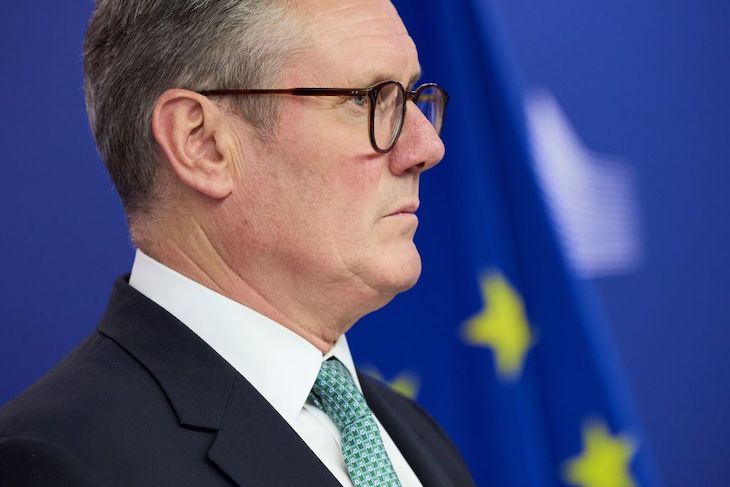The reactions to Donald Trump’s tariffs between London and Brussels could not be more different. Where Keir Starmer was conciliatory, stressing that his government still hoped to negotiate with the US, European Commission President Ursula von der Leyen was quickly out of the blocks with threats of retaliation, saying that a package of measures was being finalised.
It has since emerged that the EU plans to wait four weeks before imposing any retaliatory measures. Nevertheless it does rather expose the difference between the EU and post-Brexit Britain. The EU sees itself as a match for the US, and views Trump’s declaration of trade war as a power game. Britain, on the other hand, can afford to be more pragmatic, working out how it can play the situation best to its advantage.
Many Labour MPs scorned the idea of post-Brexit Britain becoming a ‘Singapore on Thames’, but that is where we are now. Like Singapore, we have been subjected to a relatively light tariff of 10 per cent. While that is unwelcome, it does at least gain us some advantage over countries which have been hit much harder. Britain’s strategy now needs to ensure it becomes the safe haven from the surrounding battle, rather than be caught in the crossfire. In achieving that, Starmer has not made a bad start.
As for the EU, it must be hugely tempting to fire back at Trump just as heavily as he has blasted at the EU. But that ignores something which ought to be obvious: when you charge punitive tariffs on imports you don’t just damage the foreign companies selling you goods and services, but the consumers who want to buy them. It is not just consumers, but your own manufacturers who rely on imported parts and raw materials.
The most obvious effect of the EU imposing a standard tariff of 20 per cent on good imported from the US – mirroring Trump’s new tariff on them – would be to inflate the price of energy. Fossil fuels are the EU’s single biggest import from the US: petroleum followed by natural gas. Since Russia invaded Ukraine, Europe has switched from reliance on Russian gas to reliance on liquified natural gas (LNG) from the US. Does Ursula von der Leyen really want to make it more expensive for Europeans to heat their homes? Does she really want to make life even harder for European manufacturers already suffering high energy costs as a result of net zero policies?
The EU’s second largest import from the US is pharmaceuticals. Again, does von der Leyen really want to push up the drugs bill for Europe’s public health systems? An alternative, and more likely form, of retaliation is targeted tariffs on specific goods which have a particular iconic status. Pity anyone who was hoping to buy a Harley Davidson motor cycle in the coming months.
Another attractive target for retaliatory tariffs will be cars. Nothing would please many Europeans more than the sight of Teslas being slapped with an import tariff. There are, however, two problems with trying to directly target Elon Musk, and via him the Trump administration. Firstly, Tesla supplies many of its cars to the European market via a factory in Berlin, so they are not imported to the EU from the US. Secondly, the EU already charges tariffs of 20 per cent on car imports from the US – twice what, until this week, the US was charging on cars travelling in the other direction. The EU also already blocks many imports of US food, either with tariffs or non-tariff barriers.
Starmer’s measured reaction is like to emerge over the next few weeks as the more sensible one. Von der Leyen, on the other hand, is likely to march her trade troops to the top of the hill and then march them back down again.








Comments